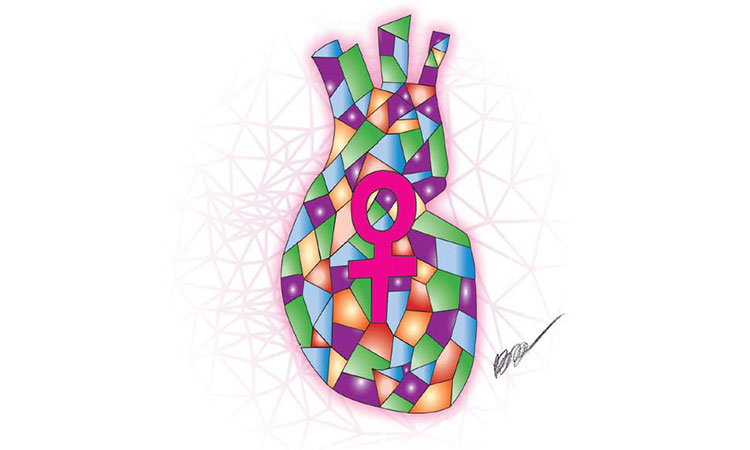
I recently had the pleasure of speaking with cardiologist and author of Women and Cardiovascular Disease, Dr. Kevin R. Campbell (Imperial College Press) regarding heart disease prevention, medical breakthroughs, and what we can do to keep our hearts healthy and strong. Not only is he a talented medical professional, but his passion for spreading awareness and advocating for cardiovascular care is even more inspiring. Here’s what he had to say:

RC: As a physician, are there any medical insights or breakthroughs relating to the heart that you want to share?
KC: We certainly know that prevention is critical. Diet and exercise, as boring as that is, has a great deal to do with prevention. In addition, we have so many wonderful drugs that have been studied in randomized controlled clinical trials that allow us to make a difference. For instance, if we treat your cholesterol with a certain type of drug, we have outcome data to suggest that we can decrease your mortality. Same with other drugs called ACE inhibitors or beta blockers. These are well studied and have been shown to decrease mortality. On the device side, we have a lot of new stents or metal tooths that we can put inside the heart arteries to prevent and stop heart attacks in their tracks. We can also prevent sudden cardiac death by implanting devices known as implantable cardioverter defibrillators (ICD’s).
RC: In your book, there are quite a few chapters covering obesity. Do you find that obesity is more prevalent as the years go on?
KC: Absolutely—obesity is epidemic in the US today. We spend more than $150 billion treating obesity and obesity-related illnesses. I find that in general, obesity is something that puts us at risk for high blood pressure, high cholesterol and can lead to heart disease. There’s data to support that one in three American children are either overweight or obese and adults have about a 30 percent obesity rate, modeling poor behaviors for our children. If we don’t change it, well over 50 percent of the population is going to obese by the year 2020.
RC: Children typically aren’t diagnosed with heart disease, mostly because of obesity, is it something that happens later on in life?
KC: Heart disease is an accumulation of risk. So if you have 25 years of high blood pressure, and 25 years of high cholesterol, you’re going to develop plaques in your arteries that will ultimately rupture, and block up the entire coronary artery. That’s a heart attack. This is why it’s so important to modify risk at an early age. Now, you can’t change your genetics – family history and genes play a role, but if you don’t smoke and you control your cholesterol and blood pressure, or if you have diabetes and keep your blood sugars under control, you’re more likely to limit your exposure and risk.
RC: Are women more prone to heart disease than men?
KC: The prevalence of heart disease is similar in both men and women. However, women tend to be under-diagnosed, undertreated and underserved. More women than men in the US die of heart disease every year. But for some reason, heart disease is thought to be a man’s disease. Most women think their greatest health risk comes from breast cancer or uterine cancer, causing a lot of misconception. In fact, heart disease kills more women than all cancers in the US today. Luckily, we’re doing a better job during the last five years with advocacy efforts, such as Wear Red Day and Go Red for Women, as we’ll be doing in February all month long to raise awareness.
RC: What are steps we can take to bring ourselves into awareness on what to do and how to maintain a healthy heart?
KC: Ask yourself: what risk factors do I have? Do you have a history of heart disease? Do you have high blood pressure? Are you obese? The more risk factors you have, the higher your risk of developing heart disease. The next step is to partner with a primary care physician who will help you modify your risks, who will walk the journey with you down the road to better your heart health by designing a diet and exercise plan and setting goals. Once you’ve reached those goals, it may be that they have to treat you with medicine for your high blood pressure, diabetes, or cholesterol. You work together to stop smoking if you’re smoking.
The final step is constant reevaluation. Where am I? Have I stuck with the program? Have I achieved these goals? Setting small, attainable goals and then resetting those goals makes a big difference.
RC: Do you feel that stress plays a factor in our heart health?
KC: Absolutely. In particular with professional women like yourself, you’re really stressed because you’re trying to do 10 things at once. I advise those women to take 15 minutes for themselves every day no matter how hard it is to meditate or just zone out, focus on their breathing and on the moment. That is a good way to reduce adrenaline levels, cortisol levels, and all the things that get our bodies charged up that can damage blood vessels and raise blood pressure and heart rate—ultimately leading to heart attack and stroke.
RC: What was your inspiration for writing the book?
KC: My daughter. She is now 14 years old but when she was diagnosed with insulin-dependent diabetes when she was 5, I was inspired to make sure there were health care professionals and women around the world who realized that heart disease was their greatest risk. I want to make sure that someone’s around when I’m not here to advocate for my daughter and understand that she is at risk for heart disease and will work with her to modify her risks. She even drew the cover art for my book.

Rose Caiola
Inspired. Rewired.
Click here to find out more about Rose’s thoughts on wellbeing and health

